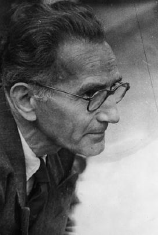July 12: Günther Anders
Günther Anders (1902)
It was on this date, July 12, 1902, that Austrian philosopher Günther Anders, originally Günther Siegmund Stern, was born in Breslau, the offspring of Clara and William Stern, founders of child psychology. An assimilated Jewish intellectual, he found that there were too many writers using the name Stern, so his editor suggested he write under a different name. Taking this literally, he adopted the name Anders—which means “different.” He earned his PhD in philosophy in 1923, studying under Martin Heidegger, with Edmund Husserl as his doctoral advisor. Anders fled Nazi Germany for Paris in 1933, then to the United States in 1936. He returned to Europe in 1950. He wrote on such topics as the effects of mass media on our emotional and ethical existence, the nuclear threat, the Holocaust and the question of being a philosopher.
Anders co-founded the European anti-nuclear movement in 1954. In 1956 Anders published his magnum opus, The Antiquatedness of Humanity, including “The Bomb and the Roots of Our Blindness toward the Apocalypse.” Although his outlook for humanity was bleak, it was also conspicuously godless. In a letter to the grandson of his colleague, Herbert Marcuse, on the occasion of the birth of Marcuse’s great-grandson, Anders wrote, “If I knew what a ‘blessing’ is, I’d close my letter: ‘you have my blessing!’” In 1992, shortly before his death, Anders was awarded the Sigmund Freud Prize for Scientific Prose, one of very few philosophers so honored. He was married until 1937 to another Sigmund Freud Prize winner, Hannah Arendt.
Günther Anders died at age 90 on 17 December 1992 in Vienna. Paul van Dijk, in Anthropology in the Age of Technology (2000), wrote of Anders, “His Jewish self-consciousness reveals itself in the acknowledgment that he is never more ashamed than when meeting a Jew who is ashamed to be a Jew. The Judaism that Anders represents with the fierceness and decisiveness that is so characteristic of him is, however, a modern, secular, and humanistic Judaism.”
Originally published July 2003 by Ronald Bruce Meyer.


